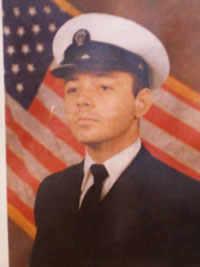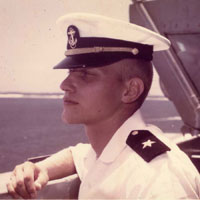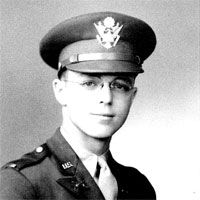 Russ Goodwin
Russ Goodwin
Russ enlisted and went to Boot Camp on January 30, 1977 and graduated on April 1, 1977.
He was sent to Great Lakes Recruit Training command in Great Lakes Illinois.
Russ entered a Seaman Recruit (E-1) and left a Seaman E-3).
He went on to a 20 year career in the military retiring on February 1, 1997.
 Bob McNamara
Bob McNamara
Bob enlisted in the Navy in 1969, initially serving as an electronics technician. A year later, he was selected for flight training. His 25 year career included aircraft maintenance, personnel administration, combat operations, flight instruction, logistics support, systems engineering, and command of a carrier-based squadron.
 Rupert “Twink” Starr
Rupert “Twink” Starr
Columbus, Ohio World War II Veteran
Video Profile
Click here to view this video on SWCTV
Courage Under Fire, from the Liberty Eduction Forum, April 2005
In the Line of Fire by Rupert Starr
I’ve never forgotten the sound of those bullets whizzing by my head. Decades later, the sound still echoes in my mind, giving more significance to every sunrise and more meaning to every day. For more than five decades, I didn’t talk about my experience as a Prisoner of War during World War II. I wasn’t active in the American Legion. I didn’t show people my bronze star, get a special license plate, or march in Veteran’s Day parades. However, in recent years, I’ve shared my story not to get recognition, but merely to make a point. In military service, courage matters, not sexual orientation.
The gay and lesbian service members who are serving in silence and risking their lives in Iraq and Afghanistan demonstrate that you don’t need to be straight to shoot straight.
Facing death gives you a different perspective on life. For me, that perspective came as a 22-year-old second Lieutenant serving in the 422nd regiment of the 106th infantry division. Our unit arrived in the European theater in December 1944, less than a week before the Germans launched what became known as the Battle of the Bulge.
When the fighting started, I got sent to the frontlines. Two days later, my Colonel gathered the officers together – telling us the advancing German Army had surrounded our unit and cut us off from division headquarters. Then he asked for volunteers to go behind enemy lines to re-establish communication with division headquarters. No one volunteered, so I did.
A sergeant and I set off immediately – walking toward enemy lines through two feet of snow. I was beyond scared as we tried to avoid getting captured or shot by German soldiers. I would later learn our unit surrendered after being overrun. During three days behind enemy lines, we joined a small group of other American soldiers. Eventually, we became surrounded on all sides, so it was either die or surrender.
After a forced march into Germany, I was among 200 POWs who were jammed into boxcars and sent to a prison camp in Poland. With Russians advancing into Poland, our captor marched us back toward Germany as temperatures fell 30 degrees below zero. Our German captors finally abandoned us in a small farm town. Boarding a ship for America in April 1945, I felt pride, but I didn’t consider myself a hero because I had just done my duty. The real heroes never came home.
My experience as a POW gave me the courage to make peace with my sexual orientation. My late partner Allan and I were together for 52 years. My experience in war also gives me the courage to speak out on behalf of today’s warriors who serve in silence. The military’s “Don’t Ask, Don’t Tell” policy weakens national defense and harms military readiness. Let me highlight a few reasons why gays and lesbians should be allowed to serve openly and honestly in the military.
First, we’re losing well trained and qualified service members when we most need them. Government statistics show that 12,000 service members have been kicked out since 1993, including hundreds of intelligence experts, translators, and other desperately needed personnel. Tens of thousands of other experienced service members have cut short their military careers because of this burdensome policy. Many other gay people skip military service altogether because of this policy.
Second, the “Don’t Ask, Don’t Tell” policy exacerbates the military’s recruiting problems. The U.S. Army, the Army Reserves, and the Army National Guard likely will miss recruiting goals this year, yet we’re excluding a huge pool of potential recruits. A recent study shows that lifting the ban could attract as many as 41,000 new recruits.
Third, the rationale used to justify the policy has been proven wrong. Research from a University of California think-tank shows our allies with openly gay service members – Great Britain, Israel, and Canada, for example – have experienced no detrimental impact on troop morale or unit cohesion.
Finally, if the military service of gay and lesbian people was actually detrimental to unit cohesion and morale, troop discharges would increase during war, when the stakes are highest. But the opposite has happened during our wars in Afghanistan and Iraq. The 49% drop in discharges since 2001 undermines the policy’s rationale.
During his first firefight in World War II, my best friend was evacuated from the front because he nearly lost his mind. It didn’t matter he was straight. He just couldn’t stand the heat of battle. I’m proud to say I could and there are tens of thousands of other gay Americans who also can stand up under fire. The Urban Institute used census data to estimate 65,000 gays and lesbians in the U.S. Armed Forces and a total of 1,000,000 gay and lesbian vets. I thank them for their service, and I say to our nations’ leaders, it’s time to improve our military readiness and strengthen our national defense by allowing gay and lesbian Americans to serve openly and honestly in the U.S. military.
++++++++++++++++++++++
Rupert Starr is retired and lives in Columbus Ohio.

 Rupert “Twink” Starr
Rupert “Twink” Starr


